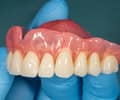How to Fix Ill-Fitting Dentures
Did you know that your jaw and gumlines can change shape over time? That means that if you have false teeth, they can become loose or ill-fitting. If your dentures have become loose, you may notice that your gums are irritated or that you’re having trouble eating. If this happens, remember that you shouldn’t fix ill-fitting dentures by using denture adhesives. According to the American College of Prosthodontists, if your dentures no longer fit as well as they once did, you may need to go to your dentist to refit the denture base. This procedure is called relining. Alternatively, your dentist may decide that your dentures need to be remade altogether with a new base and set of teeth.
How to Fix Broken Dentures
Dentures can break or become damaged for many reasons, including being dropped on hard surfaces and general wear and tear. Additionally, according to the American Dental Association, partial dentures can get damaged if you bite down to fit them into place. Biting down could break or bend the clasps.
If your false teeth do break, your dentist is the only person who can fix them. Over-the-counter glues can contain harmful chemicals, and you should stay away from them. Incorrectly fixing dentures can also lead to mouth sores or general irritation in your mouth, which can need days of oral maintenance on your part. Meanwhile, a dentist can often fix your dentures in just a day or so.
How to Fix Problems with Implant-Supported Dentures
While implant-supported dentures can be a great solution if you’re missing several teeth in a row, they can sometimes loosen from their base and supporting screws, making them unsteady. Grinding or clenching your teeth is one thing that can loosen your implant-supported dentures. Like complete or partial dentures, a dentist is the best person to fix any problems with your implant-supported dentures.
Maintaining Dentures
Now you know what to do if something happens to your dentures, but it’s also important to carefully maintain them so that they’re less likely to get damaged. You should never wear your dentures all day and night without properly cleaning them. The American Dental Association recommends that you place your denture in water or a denture cleanser solution every night to retain its shape. Meanwhile, the American College of Prosthodontists recommends against using regular toothpaste to clean your dentures. Instead, use a nonabrasive denture cleanser and special denture brush to clean them every night.
While fixing your broken or ill-fitting dentures yourself might seem tempting, in reality, this can be harmful to your health and won’t be a long-term solution. Your dentist is always the best person to consult when something’s wrong with your dentures. A short visit to your dentist can result in long-term comfort!
This article is intended to promote understanding of and knowledge about general oral health topics. It is not intended to be a substitute for professional advice, diagnosis or treatment. Always seek the advice of your dentist or other qualified healthcare provider with any questions you may have regarding a medical condition or treatment.
ORAL HEALTH QUIZ
What's behind your smile?
Take our Oral Health assessment to get the most from your oral care routine
ORAL HEALTH QUIZ
What's behind your smile?
Take our Oral Health assessment to get the most from your oral care routine
Join Us
Get the best of your oral health routine and take it to the next level with expert advice, recommendations, products and solutions and special offers.
Join Us
Get the best of your oral health routine and take it to the next level with expert advice, recommendations, products and solutions and special offers.















